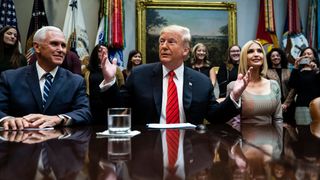While impeachment has many political dimensions that will shape whether a president survives it – Andrew Johnson and Bill Clinton did, but Richard Nixon did not – there are two things that stick with the president who is the target of it: Impeachment is weakness. Impeachment is ridicule.
Weakness because a president’s stature is inevitably diminished by the House of Representatives beginning the process of removing the president from office.
Ridicule because being a president under impeachment means that the leader of the free world has made grave, stupid and avoidable errors of action, judgement or comportment that have opened him to the humiliating, infuriating prospect of removal from office.
Weak presidents are not always impeached (see: Jimmy Carter). Presidents who were ridiculed have not always been impeached (see: Gerald Ford and Chevy Chase skewering a hapless 38th president).
Impeachment generally unfolds in the context of a president’s standing at home: Will he survive? Will he and his party suffer at the next election? But less visible or appreciated is the extent to which impeachment can affect a president’s standing overseas, and his ability to execute his foreign policy goals. This is because presidents lose leverage when they are under the threat of being removed from office.
Nixon could not advance America’s end to its involvement in Vietnam when impeachment was under way. Bill Clinton could not bridge the final gap between the PLO chairman Yasser Arafat and Prime Minister Ehud Barak at Camp David, and seal an historic peace agreement between Israel and Palestine.
Trump impeachment inquiry — The outcome is uncertain, but political mess is guaranteed

One wonders whether an unencumbered Nixon could have continued to unleash American power to get more concessions from North Vietnam in 1974. And might Bill Clinton have been in a more commanding face-to-face position, unblemished by the months of tabloid scandal coverage of his misadventures, to jawbone Arafat more effectively to make the deal with Barak?
Trump’s impending impeachment is already affecting his ability to secure his foreign policy objectives in three crucial areas:
On the trade war with China, Trump has had to settle for a partial deal now, instead of a comprehensive deal later – and there are serious questions that have been raised (such as by USSC colleague Stephen Kirchner) about how good the interim agreement is, and whether China is honouring it. While China is indeed hurting under the pressure of the tariff wars, Trump absolutely needs to deliver wins on the trade issue for his base – particularly in the farm belt – to win in 2020. China knows it and has clearly exploited a visible weakness in Trump’s posture.
Kim Jong Un also knows that Trump needs to show meaningful progress on his most ambitious foreign policy goal of removing North Korea’s nuclear arsenal. And Kim is playing hardball: either we have movement by the end of the year, or all bets are off. The risks are that Kim could resume nuclear testing. In the face of a clear marker that his high wire summitry has failed, Trump could be forced to go back to “Rocket Man” and threats to obliterate North Korea.
On Turkey, a key member of the House Republican leadership believes that Erdogan, seeing Trump under the threat of impeachment, was emboldened in his play for northern Syria – that he could get away with it at a tiny price. So far, Erdogan is winning that bet.
Up and down Massachusetts Avenue in Washington DC, ambassadors are sending cables back to their capitals handicapping the impeachment of Donald J. Trump, and whether they will see President Pence in the early weeks of 2020. Those cables alone mean that Trump is weaker today than he was in August. And behind every cable is ridicule.
How Trump emerges from the impeachment drama will determine whether these early signs of siege by America’s adversaries will not only continue, but deepen.






